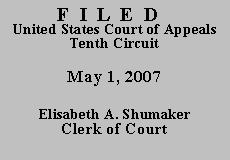

| DOMINIC GROLL, |
|
Less than a month later, the Supreme Court rejected the total exhaustion rule in Jones v. Bock, --U.S.--, 127 S. Ct. 910, 924-26 (2007) ("[I]f a complaint contains both good and bad claims, the court proceeds with the good and leaves the bad."). It further determined that exhaustion is an affirmative defense, not a pleading requirement. Id. at 921. Thus, district courts now may raise exhaustion sua sponte only in "rare cases" where "it is clear from the face of the complaint that the prisoner has not exhausted his administrative remedies." Aquilar-Avellaveda v. Terrell, 478 F.3d 1223, 1225 (10th Cir. 2007).
This is not one of those rare cases. Mr. Groll's pro se complaint, which we construe liberally, see Haines v. Kerner, 404 U.S. 519, 520-21 (1972), documented the grievances he filed with respect to his working conditions, see R. Doc. 3, at 4. Although Mr. Groll did not allege that he exhausted his retaliation claim, he attached a letter to Defendant Warden Bobby Johnson complaining about the situation. See id. Ex. A. He later made clear that he had attempted to pursue a retaliation grievance but that Warden Johnson refused to provide him with a grievance form because his complaint did not raise a grievable issue. R. Doc. 6, at 3. The Defendants have not responded to these allegations, nor have they raised failure to exhaust as an affirmative defense. Accordingly, the district court erred in dismissing Mr. Groll's lawsuit. See Freeman v. Watkins, 479 F.3d 1257, 1260 (10th Cir. 2007).
Exercising our jurisdiction pursuant to 28 U.S.C. 1291, we VACATE the decision below and REMAND for further proceedings. On remand, the Defendants may raise any applicable defenses. Mr. Groll's motion to proceed in forma pauperis pursuant to 28 U.S.C. 1915 is GRANTED, and he is reminded of his obligation to continue making partial payments until the filing fee is paid in full.
Entered for the Court
Paul J. Kelly, Jr.
Circuit Judge
*. This order and judgment is not binding precedent, except under the doctrines of law of the case, res judicata, and collateral estoppel. It may be cited, however, for its persuasive value consistent with Fed. R. App. P. 32.1 and 10th Cir. R. 32.1.
2. After examining the briefs and the appellate record, this three-judge panel has determined unanimously that oral argument would not be of material assistance in the determination of this appeal. See Fed. R. App. P. 34(a); 10th Cir. R. 34.1(G). The cause is therefore ordered submitted without oral argument.